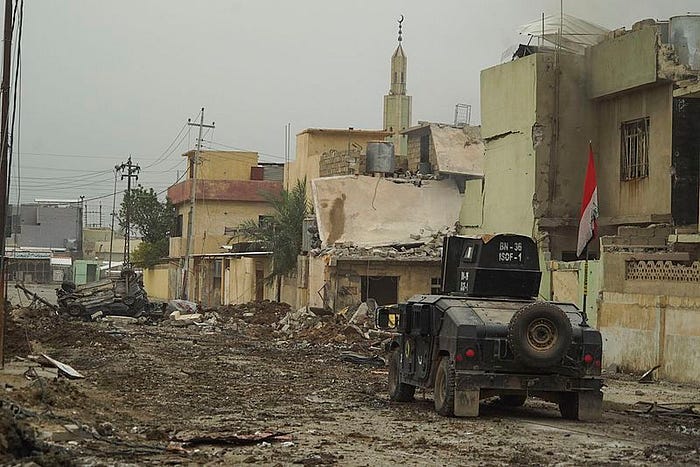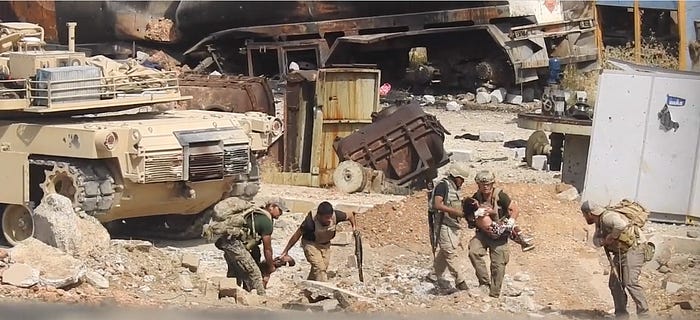He Came Face To Face With Evil And Learned How To Forgive
A powerful lesson from a former Navy SEAL battling ISIS

“Somehow, she’d survived the massacre when ISIS had opened fire on civilians fleeing the city. That was almost two days ago. Now, in a pile of rotting corpses she huddled next to her dead mother’s body suffering an even more cruel demise under the relentless desert sun. No doubt ISIS had left her as bait, and we’d taken it.”
— City of Death: Humanitarian Warriors in the Battle of Mosul, Ephraim Mattos, Scott McEwen
The historian Will Durant once said history as written is usually different from history as lived. By this he means the extreme is recorded before the ordinary. So, it tends to skew reality.
I believe this to be true, but not all extremes are covered equally, and some fade behind others. While not “forgotten,” many miss them. One of these events happened in May of 2017.
On its face, the instance perfectly captures both the depravity and heroism which can exist in the same species of humanity.
On the darker end, ISIS fought to maintain their hold on the city of Mosul versus the Iraqi army. And they let any end justify the means. The terrorist group considered civilians leaving the warzone traders, and slaughtered them indiscriminately. Even children weren’t safe from their wrath.
On the brighter end, unfathomable heroism took place daily.
In one instance, a group of volunteers crept behind an Abrams battle tank. As machine gun fire rained down from a bombed-out hospital, some of the men behind the vehicle darted out into no-man’s land. They crossed an area with no cover, filled with corpses, grabbing a child and survivors.
And this was only one instance. Former Navy SEAL Ephraim Mattos in his book City of Death, details his time in Iraq working with a unique charity, and the staggering carnage he witnessed dished out by ISIS.
In many ways, it was like a face-to-face meeting with evil. Ultimately the encounter changed him, teaching a lesson many may struggle to understand.
Moreover, Mattos explains while we innately know war destroys soldiers, civilians often get hit harder. He learned this in the darkest of ways.
The Purple Backpack
Mattos first deployed to Afghanistan. On an initial patrol, his group found a purple child’s backpack filled with explosives — a suicide bomb. They met its builders not long after.
The SEAL team encountered the Taliban, and after the engagement, Mattos was ordered to guard a field, protecting his team from ambush. As he peered out over the ground, there was movement. He zoomed the scope of his sniper rifle closer and caught a glimpse of two faces.
It was two little girls, holding hands, charging towards Mattos with tears streaming down their faces. Both wore purple backpacks. They were coming into detonation range, and Mattos needed to make a terrible decision quickly. As his finger readied, he desperately yelled at them to back away.
Fortunately, they stopped, and returned, but it brought him no comfort. Mattos says:
“The encounter with the little girls had flipped a switch in me, unlocking a hatred for the enemy in me that continued to well up.”
He had nightmares where he pulled the trigger, his nieces’ faces on the kids’ bodies. His time as a SEAL was filled with depression. It just wasn’t a good fit.
Mattos joined the military because he wanted to help people but thought he could have a better impact in a different way. His brother was doing humanitarian work in India. So, he asked for advice.
To Iraq Via Burma
Mattos’ brother told him about the Free Burma Rangers (FBR). They were a group of ex-military that provided medical aid and support to those stuck in war zones. As Mattos’ time in the military was ending, he visited the group in Burma.
He met with their founder David Eubank. The group was created to help displaced native people in Burma that were being slaughtered by their government. Mattos visited refugee camps and instantly wanted to join.
Eubank explained a peace agreement was just signed, so in a slower interim, the group was heading to Iraq to help those being liberated from ISIS. They’d document atrocities, feed the hungry, and supply medical aid in areas no one else would go. The former SEAL signed up.
FBR In A War Zone
Eubank affectionally told Mattos his organization was more like Mr. Bean than special forces, and it became shockingly apparent. They operated out of bombed out houses, filled from floor to ceiling with medical supplies, food, and water. The team itself was an odd mix.
Former special forces soldiers
Battlefield medics made of displaced Karen people from Burma
Translators usually from Iraq
Volunteers from church groups
They traveled around in an armored ambulance and carried weapons and body armor because they expected to be shot at. However, the weapons were whatever they could get — mostly junk stolen from ISIS. Mattos was appointed their sniper and given an AK47 that “sort of shot straight.”
According to Mattos, FBR “assumed an astronomically higher level of risk than one would in the U.S. military.” And everywhere they went became an emergency room. The charity was invited into the war zone by the Iraqi government itself; often they worked directly with them in the field.
They built up friendships with Iraqi soldiers, and provided them medical aid, as well as civilians. In fact, they’d ride into the conflict zone right behind their armored vehicles. Mattos describes pulling soldiers out of an armored personnel carrier that ran over a land mine while bullets flew by.

In fact, FBR gave tons of food, water, and medical supplies to the Iraqi army to distribute, so they could win back the favor of their own people. Many in ISIS-controlled territory felt abandoned by their government, so the distributions helped smooth over the animosity.
Mattos and his co-volunteers also found themselves right on the front lines in one of the biggest military actions since WWII (The Battle of Mosul, May 2017.)
Breaking Down A Battle-Hardened Soul
Mattos describes the Iraqi army as incredibly brave, but inept on a level that defied imagination, saying:
“Having just come from one of the most elite close quarter combat units in the world, I wanted to laugh, cry, scream, and run away all at the same time.”
FBR often got caught in fire fights right beside them, treating soldiers and civilians liberated from ISIS. The first day in Mosul was soul crushing.
A Humvee loaned to the group by the army got shot to pieces trying to save wounded civilians. In the carnage, one of their translators was killed, and an Iraqi soldier close to the group got shot six times trying to transport the stranded civilians to safety.
Another member of the FBR team had to drive into the ambush and pull the stranded Humvee out with another truck. As Mattos ran to the shot-up vehicle, David Eubank and another team member were stabilizing civilians inside that were shot by ISIS.
They pulled a little body out of the passenger side. A nine-year-old little girl was shot in the head and still alive. Mattos notes:
“Today after three years of living under ISIS rule, she and her father were supposed to finally be free. But instead of freedom, she had been shot in the head by an ISIS sniper. Her yellow dress was stained with blood as she lay unconscious but alive in a twisted heap in the dirt.”
He admitted it was the first time he had ever lost composure in a battlefield situation as he helplessly held her hand while medics tried to save her life. And the carnage didn’t stop. Endless streams of “nazihin,” or displaced people escaped ISIS territory as the army moved into Mosul.
The FBR group spent many sleepless nights caring for the wounded and declaring others dead.
Mattos watched a team member shield an old woman with his own body as ISIS fired at escaping civilians. Others weren’t so lucky. He also saw an ISIS sniper kill a woman carrying her child as she tried to escape.
The ex-SEAL found himself risking his life, going into the line of fire, and taking pictures of a building where the shooter was perched, so the Iraqi army could target him. But the worst was yet to come.
A War Crime And A Rescue
As the army and FBR moved further into Mosul, they met a man who told them ISIS had killed his children in front of him as he escaped. In his own words “they killed everyone.” Not long after, the team made a grim discovery.
They came to an area near a hospital where bodies lay everywhere in clumps: dozens in all directions. As they documented the slaughter, they saw movement in one of the piles. A child and a few men were alive. But the hospital overlooked their position and was controlled by ISIS.
In fact, they were probably bait. ISIS had done this several times, baiting soldiers to save the wounded, so the rescuers could become targets.
The FBR team talked with the Iraqi army to arrange a rescue, but it fell apart. Instead of a tank and multiple Humvees, their drivers were too afraid. If FBR wanted to go in, they’d have to walk behind the tank over a large field where snipers could pick them off from the hospital.
Mattos, Eubank, and a former Marine named Sky went anyway, pulling a child and a few survivors out of the pile of bodies. Mattos got a bullet in his leg while helping to make the rescue. It marked the end of his time in Iraq.
But his mental struggles after the chaos continued.
On Healing And Forgiveness

“Humans are not capable of handling hatred. It is an infectious crippling disease, spreading from person to person, bringing unknowable amounts of violence and death. It is a selfishness and cruelty that causes all forms of evil that plague our world…”
— Ephraim Mattos, City of Death: Humanitarian Warriors in the Battle of Mosul, By Ephraim Mattos and Scott McEwen
Mattos explained his initial confrontation with the Taliban and the kids with the purple backpacks created a hatred in his soul. That depravity pushed him to want to destroy those doing it. However, Mosul marked a change.
While ISIS was the epitome of evil, the kindness and bravery Mattos witnessed in the confrontation was its mirror opposite. And it spoke volumes. Namely, it taught him to focus on the love of those “standing behind you,” and not the hatred of those “who stand in front of you.”
Otherwise, you bring that hatred within yourself, and it eats you from the inside. But Mattos took it one step further. He says:
“I learned how to forgive ISIS for the terrible things they did, not for their sake, but for mine.”
Not accepting them. Not embracing them. He even attempted to kill them while defending victims but put his hatred aside and it started to heal him mentally.
Mattos says forgiveness is something lost today. If you look at the contentiousness, violence, and lack of civility, he believes it all grows from this inability to forgive — including forgiving ourselves.
If anything positive can come out of the suffering in Mosul, perhaps it’s this lesson on forgiveness.
-Originally posted on Medium 9/16/23


